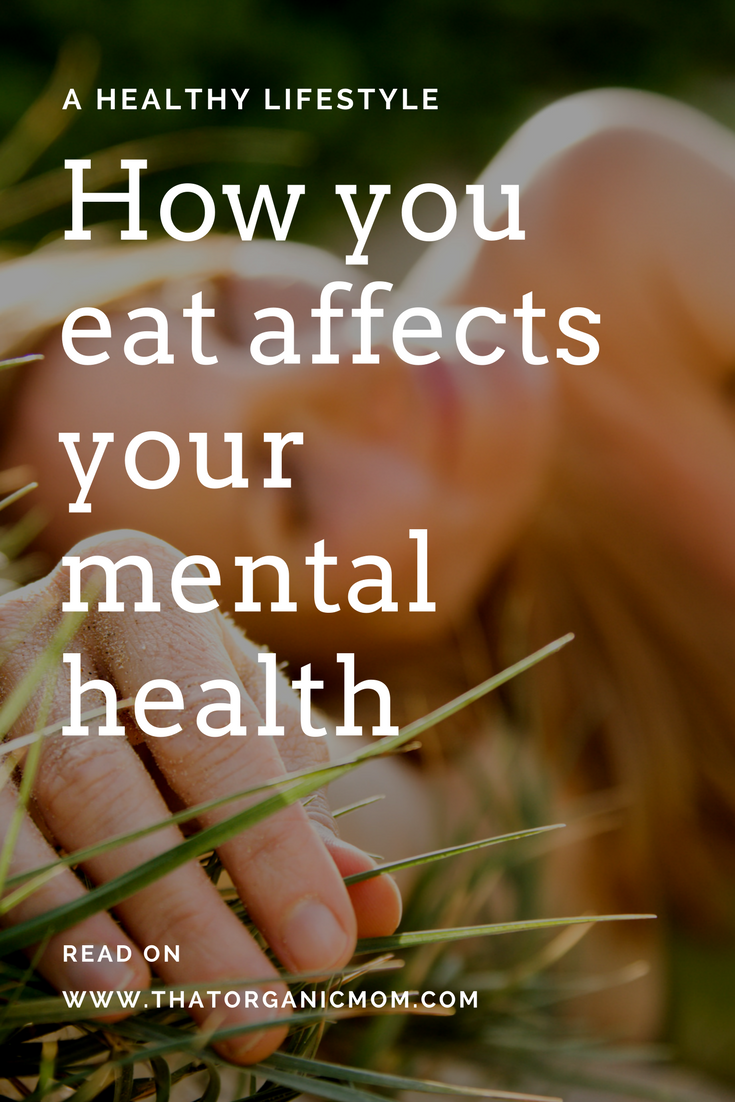Last Updated on June 29, 2022 by Rebecca Huff
Have you ever wondered how what you eat affects what you think?
Evidence reveals a definite connection between chronic diseases and mental health disorders. A certain number of conditions are related to genetics and others can be traced to environmental factors. Still, studies show lifestyle have an impact on risk factors.
Some of these problems are preventable with a healthy lifestyle that includes regular exercise, a nutritious diet, and good sleep hygiene.
Exercise
Exercise can have a direct impact on the way you think. Studies have proven time and time again that exercise has a positive impact on our mental health. (1) Moving your body through swimming, walking, gardening, dancing, and other physical activities is a bonus for good mental health.

Many nutrients such as antioxidants, fats, and amino acids are necessary for the brain to balance hormones, protect against free radicals, prevent inflammation, and keep the body oxygenated. A healthy lifestyle can often prevent mental illness, and a deficiency can aggravate some disorders.
When it comes to illness, proper nutrition is more critical than ever. That's because mental and physical health problems create a higher demand for nutrients. In fact, one of the most significant benefits of prioritizing nutrition and fitness is that it increases energy levels. Exercise and proper diet can help you achieve and maintain a more positive outlook on life. Even a daily walk outdoors can help to alleviate depression and anxiety.
Sleep Hygiene
Good sleep hygiene is incredibly beneficial for mental health, weight management, proper immune function, and cognition. Without sleep, many of the body's systems are impaired. Learn and practice good sleep hygiene habits to prevent and even reverse some types of mental illness. There are definite links between insomnia, anxiety, and depression the three can become a vicious cycle. (2)
how food affects our mental health
Studies show that iron deficiency has a connection with ADHD. Because the mineral iron is a key cofactor in the making of neurotransmitters low iron levels can lead to lowered dopamine levels. Medications used to treat the symptoms of ADHD modulate the levels of dopamine and norepinephrine in the brain, keeping more dopamine available for use by the brain. Adding more non-heme iron such as red meat, fish, and chicken to the diet might lead to improvement in symptoms. (3)
The gut-brain connection shows that gut health has a direct correlation with the nervous system. A healthy microflora can improve mood and have a positive impact on mental health. Improving gut flora is one of the best ways to boost mental health. Adding foods rich in pre and probiotics can help improve gut health. Yogurt, sauerkraut, kimchi, kefir, and kombucha, as well as asparagus, artichokes, onions, and garlic, can support good gut flora.
Filling half your plate with vegetables provides the body with fiber which will help control blood sugar and energy levels. They also contain antioxidants that can fight free radicals. The brain depends on nutrients in vegetables to function correctly.
Amino acids have a direct impact on mental health. Adding protein to meals may improve mood due to the amino acids. L glutamine is useful for depression and fatigue and provides glutamic acid necessary for proper brain function. Glutamine has a calming effect and can help fight against stress, depression, and anxiety.
Carnitine from meat, fish, and poultry improves the energy supply to the brain cells producing the ability to cope with stress for more prolonged periods of time.
Green leafy vegetables such as collards, spinach, kale and Swiss chard contain folate which produces dopamine, a neurotransmitter that helps you chill out. Dopamine from bananas can also contribute to a better mood and a sense of calm. Antioxidants found in berries assist in the production of dopamine which aids memory function and improved mood.
The amino acid Tryptophan from turkey is converted into serotonin, a neurotransmitter that helps to regulate emotions and can enhance a sense of well being. Anxiety and depression are often linked to a deficiency of serotonin. Incorporate foods that are known to help boost serotonin levels.

Drinking green tea can help to create a feeling of relaxation due to the L-Theanine, an amino acid that has a direct impact on the brain. L-Theanine can help calm nerves and improve sleep quality when you experience mild anxiety.
Omega 3's from fish improve the mood, causes better blood flow, and increases gray matter in areas of the brain related to emotion. Salmon, for example, provides omega-3 fats EPA and DHA which both contribute to emotional well being.
One study showed a 20 percent reduction in anxiety in those taking omega-3 supplements. Other research has demonstrated omega-3 fats to be as effective as antidepressants for symptoms of depression. Omega-3 fatty acid is also useful for cardiovascular health; a healthy heart is one more reason to be in a good mood! (4)
While it's best to focus on the “do's” of a healthy lifestyle, it's important to take note that the “do not's” also exist. Our physical health, as well as our mental health, can be negatively affected by sugar, gluten, and processed foods.
We have partnered with The Bed Boss to offer 20% off your mattress purchase, an exclusive offer for TOM Tribe members – use coupon code TOM20 at checkout.
Find books, tools, foods, and more help a healthy lifestyle on the TOM Recommendations page or shop ThatOrganicMom on Amazon. Hover over the little chat box to read my notes on each product.

Sources:
1 – https://www.ncbi.nlm.nih.gov/pmc/articles/PMC1470658/
2- https://www.dukehealth.org/blog/vicious-cycle-insomnia-anxiety-and-depression
3 – http://www.pedneur.com/article/S0887-8994(07)00417-1/abstract
4 – https://www.ncbi.nlm.nih.gov/pmc/articles/PMC4664844/


 Episode 14 Realistic Tips for harnessing the momentum of a New Year
Episode 14 Realistic Tips for harnessing the momentum of a New Year
Leave a Reply
You must be logged in to post a comment.